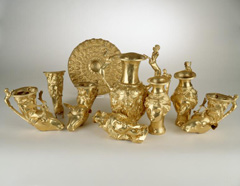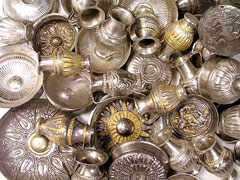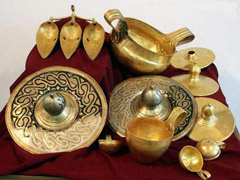
The Panagyurishte gold treasure was discovered on 08.12.1949 in the yard of a factory for ceramic products. The treasure consists of 9 parts made of pure gold with total weight of 6165,45 grams and presents a part of a serving complect. There are 4 rhytons, 3 rython-type jags, 1 rython-type amphora with two opennings, 1 flat big phiala. The three jags are shaped like female head, three rythons have the form of an animal and one of the receptacles presents a rython with long horns and a body of a goat.


The Rogozen treasure was escavated in the center of the village of Rogozen , Vratsa region. It consists of 108 phialas, 54 jags, 2 cups and 1 scyfos. The parts are 165 in total and 131 of them are goldplated. The treasure’s total weight is 19,91 kilograms.
13 of the receptacles have an inscription, saying they belonged to the Odrysian king Cotys I . He ruled from 383 to 360 year BC and his successor Cersobleptes from 359 to 340 year BC. There is an inscription with the name of the heir to the throne Sadoces, Son of king Sitalces


The Valchitran gold treasure was discovered in 1925 in the village of Valchitran, Pleven region. It was accidentally discovered by men who were working in their vineyard. That is the biggest gold treasure known to bulgarian archeology - 12.5 kg of pure gold with an natural mixture of silver, copper and iron. It consists of 13 receptacles :
Seven of them have the form of round domed pieces of different diameter with elongated central handles (very much like the drum instrument – cymbal). Four are like deep cups with pointed up-wards handles (one of them much bigger from the rest). One of the recetacles is crater-shaped with very long handles, curved sidewards.Its weight is above 4 kg. Another one with three interconnected elements like three almond bodies. The scientists dated the treasure back to the Bronze Age, XVI-XII C. BC..


